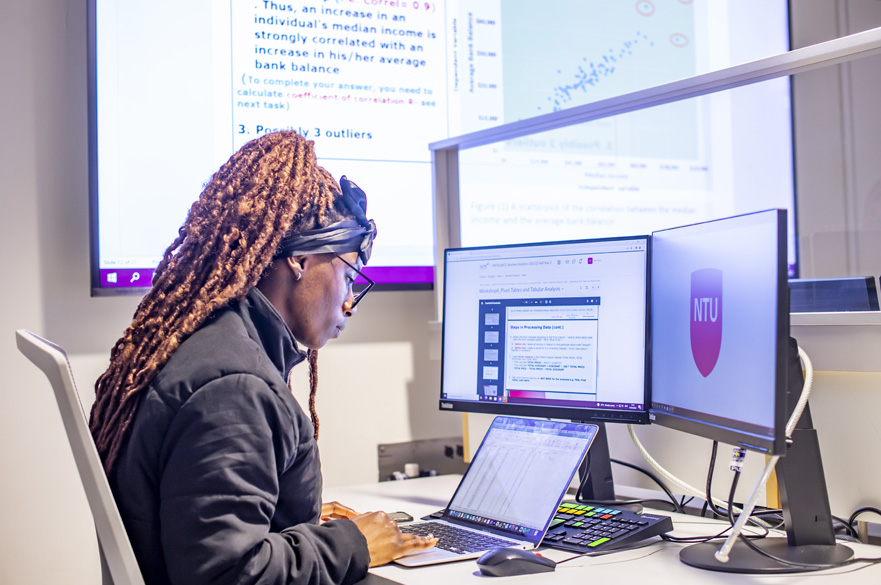Digital Finance and Data Analytics MSc
About this course
The finance landscape is rapidly transforming with a focus on digital, code-driven, and data-centric approaches, emphasising technologies like novel payment systems, distributed ledger tech, blockchains, digital currencies, AI, metaverse, and smart banking. Our MSc in Digital Finance and Data Analytics covers traditional financial markets, international financial institutions, AI, machine learning, blockchains, cryptocurrencies, and digital assets. The program delves into financial regulation, Fintech sector growth, and enhances skills in coding, big data, and econometrics. The course culminates in a hands-on consultancy project, allowing application of acquired knowledge to real-world financial data.
Finally, at the end of the course, you'll complete a hands-on consultancy project, giving you a fantastic opportunity to use the theories and knowledge you've gained to produce a meaningful piece of work.
What you’ll gain from this degree?
- Learn about technology and data-driven financial products and services together with advanced methods from the fields of computer science, mathematics, statistics, econometrics and machine learning.
- Be highly competitive for various roles in digital finance and FinTech that require a specific set of skills.
- Acquire in-depth knowledge in Digital Finance and Data Analytics specifically rather than only touching on a broader set of related topics.
- Gain comprehensive knowledge of basic as well as sophisticated mathematical and statistical tools for big data applications.
-
You will be allocated an Academic Mentor at the beginning of the academic year and you will meet with them regularly throughout the year. Your Mentor will help you make the most of your time at NBS.
-
Our students get great jobs — we’ve been ranked 1st in the UK for employability (Uni Compare 2025).
-
Learn from the experts, at a university rated TEF ‘Gold’ for teaching and learning.
-
NBS is part of the 1% of business schools worldwide to have EQUIS, AACSB and AMBA accreditation.
What you’ll study
At NBS you can create a personalised learning experience, giving you a unique Masters degree that equips you with the skills you'll need, for the career you want. Each of the modules will be delivered over a four week period, with teaching delivered in three weeks and the fourth week left clear for assessment work. This enables you to focus on one subject at a time, whilst allowing time for preparation and assessment work.
Semester one modules
- Global Financial Markets
- Principles of FinTech
- Introduction to Programming and Data Analytics for Finance and FinTech
Semester two modules
- Empirical Finance
- Principles of Machine Learning in Finance
- Contemporary Topics in Digital Finance
Semester three
- Consultancy Experience Project
Semester one
Global Financial Markets (20 credits)
Financial markets enable the transfer of funds from those who want to save to those who want to borrow to invest in productive activity. This module deepens the analysis of the major markets, participants and instruments in a global context.
Principles of FinTech (20 credits)
The Principles of FinTech module is designed to provide an introduction to the key aspects and applications of financial technology and Blockchain technology. You will develop your ability to critically evaluate the applications and limitations of each of the key technologies involved in the evolution of FinTech.
Introduction to Programming and Data Analytics for Finance and FinTech (20 credits)
Develop your understanding of Python as a coding and data analytics tool, in the context of analysing financial data. Data Analytics and Big Data play an essential role in FinTech evolution. Python, in particular, is the most popular programming language in data analytics and is used as the backbone of many FinTech applications. As such, possessing Python coding skills is a key prerequisite for anyone who is looking to make a career in FinTech and the contemporary Financial Markets.
Semester two
Empirical Finance (20 credits)
One of the key characteristics of financial markets is the huge amount of data that is available there. In this context, empirical finance can be understood as the process of data curation, model building, model calibration and the derivation as well as interpretation of results. In this module, you will run through the process of working with financial market data, from phrasing a research question to critically discussing empirical findings.
Principles of Machine Learning in Finance (20 credits)
Machine learning (ML) applications are increasingly utilised in operations of financial institutions such as banks, insurance companies and investment firms. Use cases involve portfolio optimisation, risk management, forecasting, financial advice, as well as fraud. This module introduces various techniques of ML and outlines applications to market data. You will hands-on deal with financial problems and develop ML based solutions.
Contemporary Topics in Digital Finance (20 credits)
The module will consider in detail the ethical issues associated with aspects of digital finance, the nature and foundations of ethical behaviour and whether codes of conduct engender a greater degree of ethical integrity. You will also learn about the challenges associated with the regulation of the Fintech space and the potential tension between regulation and policies to encourage growth in the FinTech sector. Finally, you will consider the link between digital finance and sustainability.
Semester three
In your final semester you'll take on a major project, giving you a fantastic opportunity to use the theories and knowledge you've gained to produce a challenging, meaningful piece of work. Projects include:
Consultancy Experience Project (40 credits)
Working as part of a team, you'll undertake focused research, developing your professional skills, managing a complex project and delivering results in a real business situation. You'll present your findings to the client and learn valuable project management tools and concepts.
For more information about semester three please visit our Experiential Projects page.
Ongoing learning
Throughout the year you will also study the following modules which will help you understand how to manage your own continuous personal and professional development (PPD).
Transformational Leadership Development (10 credits)
Transformational management education is a key focus within NBS, where effective ethical education across all business and management courses is the foundation of our students’ abilities to understand and contribute in meaningful ways towards current and future challenges in the area of sustainable development. The purpose of the module is to increase understanding of how to manage your own continuous personal and professional development in order to enable sustained career success and to be an effective and transformational leader.
Research Methods for Finance and Accounting (10 credits)
The aim of this module is to develop students as effective researchers in different contexts within the economics, finance and accounting subject areas.
Professional development
Beyond your core curriculum and comprehensive career support, you'll have access to a vibrant CPD programme. This includes your Personal Development Week, Global Responsibility Week, and events and workshops including our Business Leaders’ Lecture Series. You'll also have the chance to participate in national and international business challenges, industry talks, field trips, and company visits. We encourage you to get involved in sports, clubs, societies, volunteering, and apply for roles like course rep or student ambassador. These opportunities are designed to enhance your experience, help you thrive in the job market, and support your personal growth.
We regularly review and update our course content based on student and employer feedback, ensuring that all of our courses remain current and relevant. This may result in changes to module content or module availability in future years.
Don’t just take our word for it, hear from our students themselves
How you're taught
Teaching and Learning
Nottingham Business School offers a distinctive learning approach, combining theory, practice, observation, and reflection to enhance understanding. Throughout your studies, you'll apply various theories in practical settings, gaining insights from direct business experiences. Reflection on these experiences allows for the application of theories to guide decision-making and actions in a business context.
During your studies you will be using our Bloomberg Terminals in our dedicated Business Lab. The Bloomberg Terminal is the industry standard in financial markets by bringing together real-time data on every market, breaking news, in-depth research, powerful analytics, communications tools and world-class execution capabilities. Also, as a student of Nottingham Business School you will be able to complete the Bloomberg Market Concepts certificate with no extra costs*.
* Bloomberg Market Concepts (BMC) is an 8-hour self-paced e-learning course that provides a visual introduction to the financial markets.
Guest Lectures
Through our popular Business Leaders Lecture Series, you'll have the chance to listen to experts from a wide range of industries who will share their knowledge with you. Recent guests have included Jason Bates, the co-founder of digital banks Monzo and Starling, who is currently creating new banks and customer propositions in Hong Kong, the US, Europe, Middle East, and the UK with his consultancy group 11:FS.
Finance Simulation
Our approach to teaching incorporates a range of innovative elements aimed at providing you with a practical exposure to financial markets. One of the key highlights of the academic year is our financial markets simulation events delivered by Amplify Trading in association with the major investment bank Morgan Stanley.
Amplify trading is an award-winning FinTech company offering professional training solutions to the world’s largest financial institutions (e.g. Bank of America/Merry Lynch, Deutsch Bank, UBS, S&P).
Morgan Stanley is a major investment bank which operates in more than 42 countries and has approximately 58,000 employees.
During the Amplify/Morgan Stanley simulation events, you will be using the FlowTrader platform to experience the different roles, operations and objectives within financial markets, as you will operate on simulated or real market prices.
Academic Mentors
Every postgraduate student will be allocated an Academic Mentor at the beginning of the academic year and you will meet with them regularly throughout the year. Academic Mentors help you make the most of your time at NTU. They will support you in developing and enhancing the qualities and transferrable skills necessary for your studies, career progression, professional and personal development.
Assessments
A range of assessment methods are used across the course, the choice of which reflects the needs and demands of the different types of module. Some modules will assess the ability to work collaboratively in a team and others will assess individual capability. Types of assessment will range from examinations to group presentations including essays, reports, financial analyses, literature reviews and research based projects.
The interactive nature of the taught sessions offers opportunities to gain feedback on your performance before being formally assessed and increasing use is made of eLearning to further support the feedback process.
In-sessional English language support
In-sessional English language classes are offered to international students at no extra cost. The classes aim to provide focused support in the skills you need in order to develop your English in your subject area.
Further information please contact the Nottingham Language Centre based in the Djanogly building on City Campus:
Tel: +44 (0)115 848 6156 | Email: englishsupport@ntu.ac.uk | Website: www.ntu.ac.uk/nlc
Personalisation
We know our postgraduate students are a diverse group, with different levels of academic knowledge in their chosen area of study, different cultural and educational backgrounds, and varying levels of personal and professional skills and competencies.
At NBS we strive to ensure that these two motivating factors are nurtured and therefore supported. Our students are encouraged to practice and develop the skills and competencies required to critically reflect on their learning, and on their ability to apply this learning to their studies and to real world complex issues within the workplace. Through a series of curricula and extra-curricular initiatives, strengthened by tailored academic mentor support, NBS provides all our postgraduate students with the ability to participate in a range of challenging and unique activities, projects, events and experiences to enable our students to succeed in a competitive and dynamic global environment.
Careers and employability
At Nottingham Business School, we’re focused on your employability from the start of your postgraduate degree. We provide you with a learning experience that integrates theory and practice.
Graduates from our finance courses have gone onto roles within the public, private and third sector, undertaking positions such as:
- Equity Trader and Analyst
- Financial Associate
- Investment Manager
- Tax Accountant
- Fund Manager
Employability Team
We have a dedicated Employability Team who not only help you during your time with us but also following graduation, they’ll continue to support you by providing a number of services that will help kick-start your career.
Our Employability Team offer a wide range of support from one-to-one appointments with our specially trained consultants, to arranging recruitment fairs and skill building workshops.
Services they provide include:
- Finding placements, internships and part-time work
- Helping you to pursue self-employment
- Advice on taking gap years and time out
- Information and help on getting into volunteering
- Providing advice on further study.
As a student you will have access to our virtual learning environment, where you will be able to get in touch with our Employability team for CV support, application, interview and job hunting advice, career ideas and employer videos.
You can visit the Employability Team on your local campus every day during term time. They are also open outside of term time too, except on University closure days. So drop in, say hello, and get help with quick enquiries or book an appointment with a careers consultant from your school.
Campus and facilities
You’ll mainly be studying in our brand-new Postgraduate Centre, at the heart of our vibrant City Campus. Designed to support collaborative study, there’s a range of accessible teaching spaces, state-of-the-art technology, breakout areas, quiet work booths and a communal café. You can access dedicated market research reporting platforms and digital resources (e.g. Mintel, Passport, SPSS, and Adobe Creative Cloud) and a room equipped with Bloomberg terminals, which enables you to delve into industry-leading data, news and analytics.
NTU’s City Campus has everything you’ll need to keep occupied between lectures. As well as the Boots Library and its beautiful roof garden, there’s our superb Students’ Union building and two-storey, 100-station gym; a whole host of cafés, bars, restaurants and food outlets catering to every taste; our much-loved Global Lounge; performance and rehearsal spaces for musicians; and so much more!
If that’s not enough, just take a few steps off campus, and you’ll find yourself in the beating heart of Nottingham — one of the UK’s top 10 student cities, and one of the top 25 in all of Europe. It’s a city stuffed with history, culture, and well-kept secrets to discover at your leisure: enjoy lush green spaces, galleries, hidden cinemas and vintage shopping by day, and an acclaimed food, drink and social scene by night. For more details, why not take a Virtual Tour?
Entry requirements
UK students
You will need an undergraduate degree equivalent to a UK undergraduate honours degree (2.2 or above) containing some evidence of quantitative ability.
Additional requirements for UK students
- All applicants will be required to demonstrate a commitment to the subject they wish to study and should demonstrate how their chosen programme of study will benefit them in their future career.
- One academic reference is required.
Other qualifications and experience
We welcome applications from students with non-standard qualifications and learning backgrounds and work experience. We consider credit transfer, vocational and professional qualifications, and any work or life experience you may have.
You can view our Recognition of Prior Learning and Credit Transfer Policy which outlines the process and options available, such as recognising experiential learning and credit transfer.
Getting in touch
If you need more help or information, get in touch through our enquiry form.
International students
You will need an undergraduate degree equivalent to a UK undergraduate honours degree (2.2 or above) containing some evidence of quantitative ability.
We accept equivalent qualifications from all over the world. Please check your international entry requirements by country.
English language requirements: See our English language requirements page for requirements for your subject and information on alternative tests and Pre-sessional English.
Additional requirements for international students
- All applicants will be required to demonstrate a commitment to the subject they wish to study and should demonstrate how their chosen programme of study will benefit them in their future career.
- One academic reference is required.
Postgraduate preparation courses (Pre-Masters)
If you need help achieving the academic entry requirements, we offer a Pre-Masters course for this degree. The course is offered through our partner Nottingham Trent International College (NTIC) based on our City Campus.
English language requirements
View our English language requirements for all courses, including alternative English language tests and country qualifications accepted by the University.
If you need help achieving the language requirements, we offer a Pre-Sessional English for Academic Purposes course on our City campus which is an intensive preparation course for academic study at NTU.
Other qualifications and experience
We welcome applications from students with non-standard qualifications and learning backgrounds and work experience. We consider credit transfer, vocational and professional qualifications, and any work or life experience you may have.
You can view our Recognition of Prior Learning and Credit Transfer Policy which outlines the process and options available, such as recognising experiential learning and credit transfer.
Sign up for emails
Sign up to receive regular emails from the International Office. You'll hear about our news, scholarships and any upcoming events in your country with our expert regional teams.
Getting in touch
If you need advice about studying at NTU as an international student or how to apply, our international webpages are a great place to start. If you have any questions about your study options, your international qualifications, experience, grades or other results, please get in touch through our enquiry form. Our international teams are highly experienced in answering queries from students all over the world.
Policies
We strive to make our admissions procedures as fair and clear as possible. To find out more about how we make offers, visit our admissions policies page.











